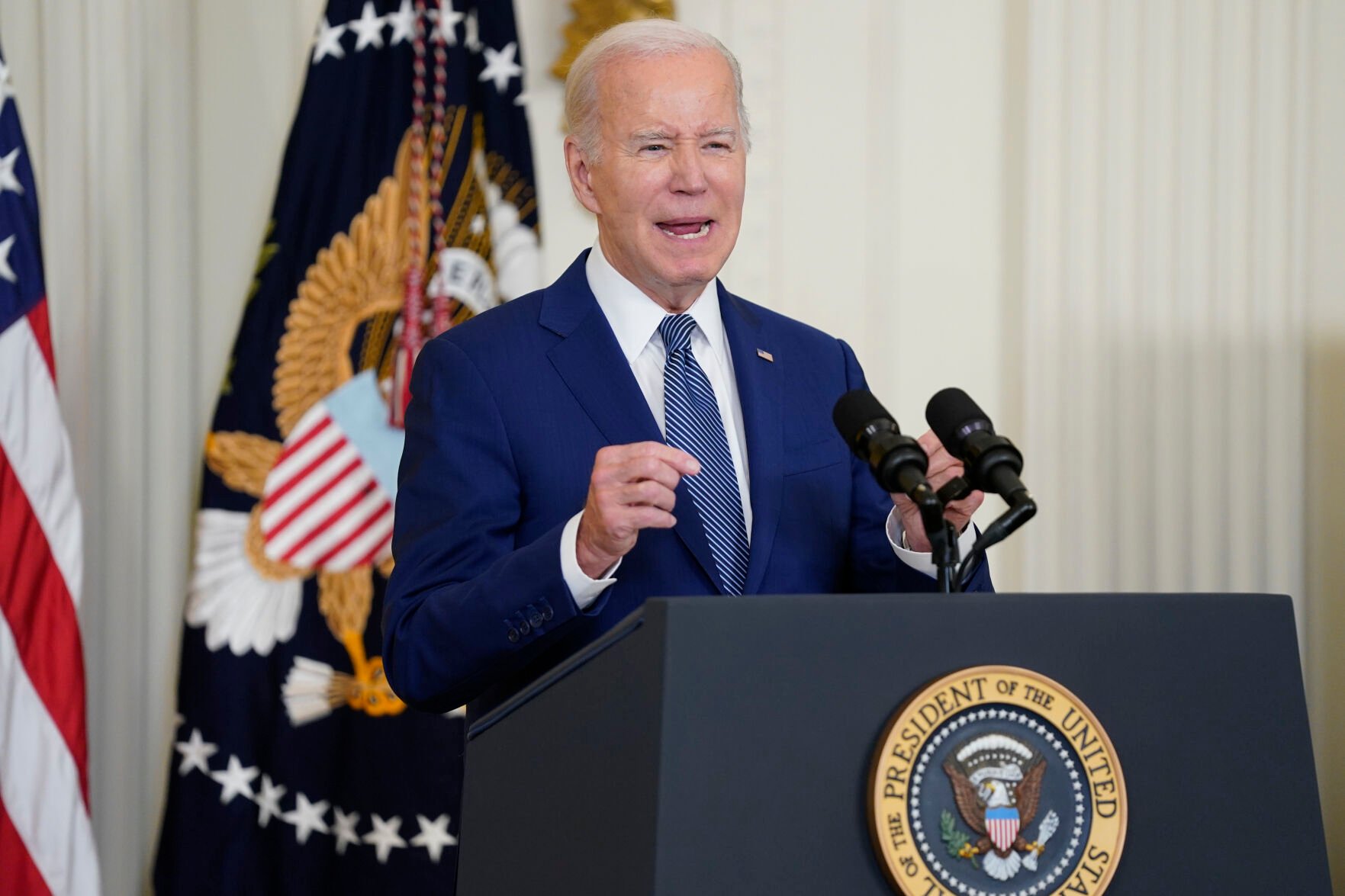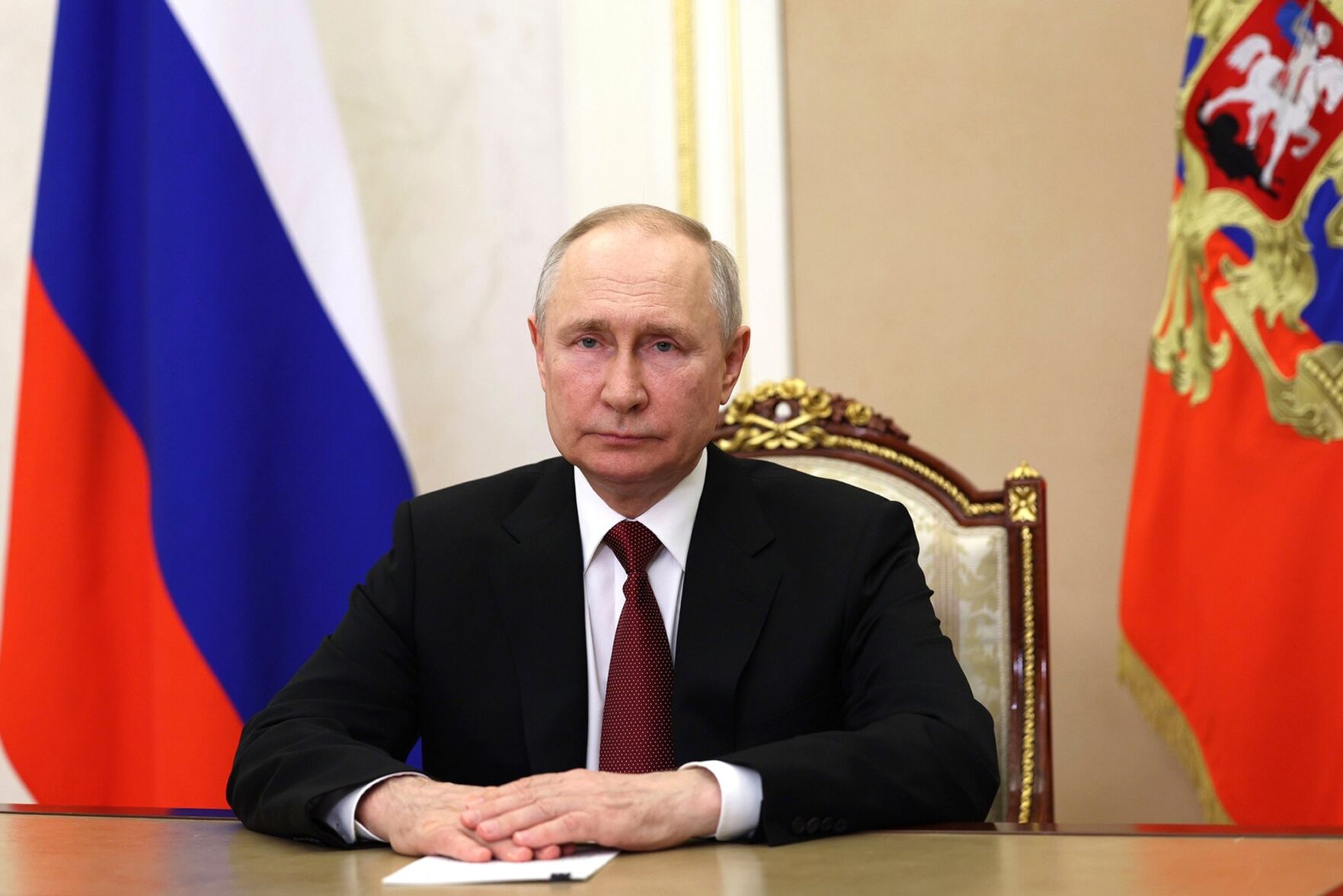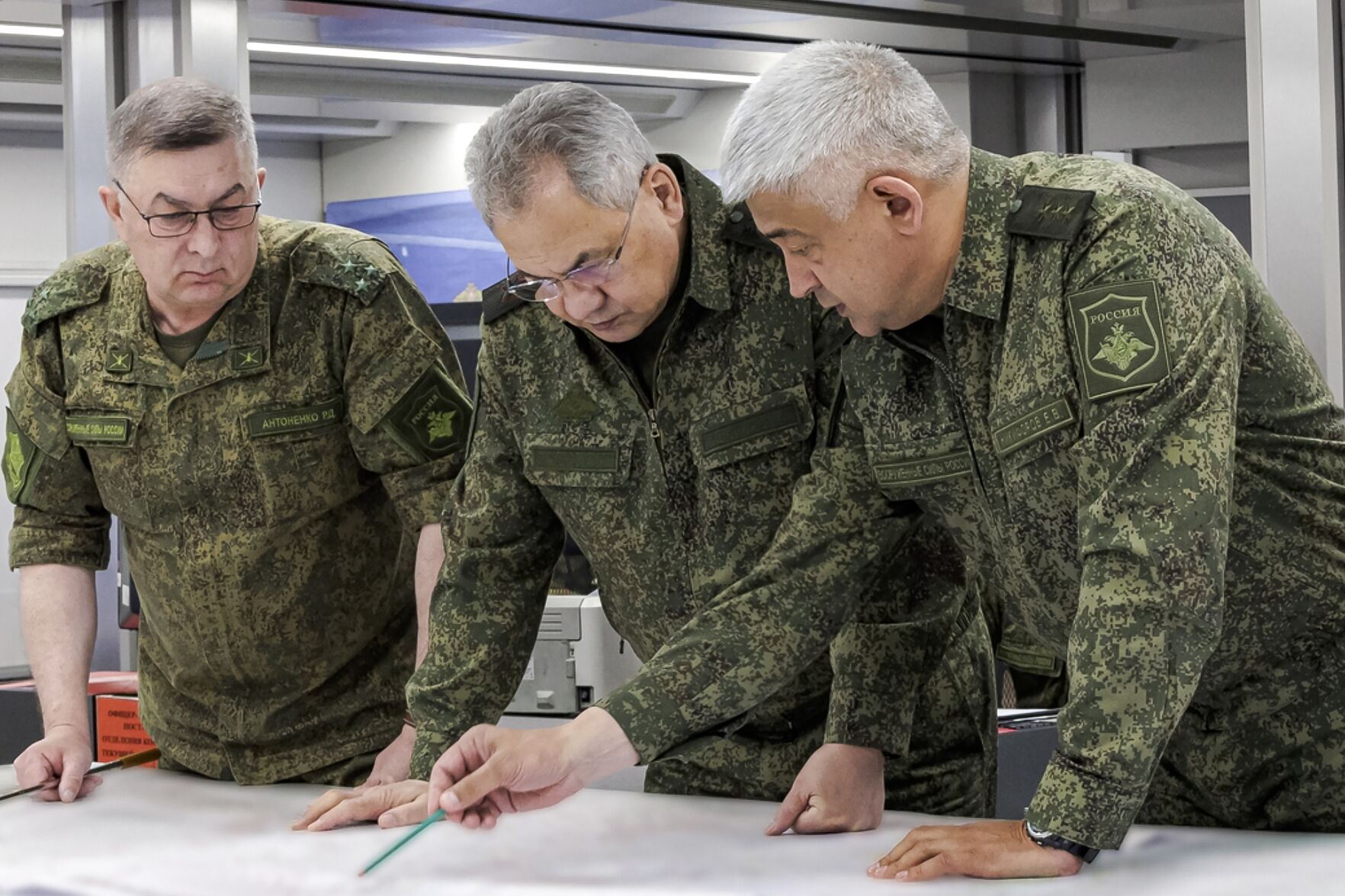WASHINGTON — President Joe Biden declared Monday that the United States and NATO played no part in the Wagner mercenary group’s short-lived insurrection in Russia, calling the uprising and the longer-term challenges it poses for President Vladimir Putin’s power “a struggle within the Russian system.”

Evan Vucci, Associated Press
President Joe Biden in the East Room of the White House on Monday in Washington.
Biden and U.S. allies supporting Ukraine in its fight against Russia’s invasion emphasized their intent to be seen as staying out of the mercenaries’ stunning insurgency, the biggest threat to Putin in his two decades leading Russia. They are concerned that Putin could use accusations of Western involvement to rally Russians to his defense.
Biden and administration officials declined an immediate assessment of what the 22-hour uprising by the Wagner Group might mean for Russia’s war in Ukraine, for mercenary chief Yevgeny Prigozhin or for Russia itself.
“We’re going to keep assessing the fallout of this weekend’s events and the implications from Russia and Ukraine,” Biden said. “But it’s still too early to reach a definitive conclusion about where this is going.”

Russian Presidential Press Service via AP
In this handout photo released Monday, Russian President Vladimir Putin addresses the participants and guests of the 11th International Youth Industrial Forum "Engineers of the Future 2023" in Moscow.
Putin on Monday blasted organizers of the weekend revolt as “traitors” who played into the hands of Ukraine’s government and its allies.
Putin said the nation stood united, and he praised the rank-and-file mercenaries for not letting the situation descend into “bloodshed.”
Earlier in the day, Prigozhin defended his short-lived insurrection and taunted Russia’s military, but said he had wasn’t seeking to stage a coup against Putin.
Putin did not name Prigozhin in his televised address but said organizers of the mutiny tried to force the group’s soldiers “to shoot their own.” Putin blamed “Russia’s enemies” and said they “miscalculated.”
The Kremlin also showed Putin meeting with top security, law enforcement and military officials, and early in the day authorities released a video of Russian Defense Minister Sergei Shoigu, whose removal Prigozhin had demanded, reviewing troops in Ukraine.
Prigozhin said he was acting to prevent the destruction of Wagner, his private military company. “We started our march because of an injustice,” he said in an 11-minute statement, giving no details about where he was or what his plans were.
The feud between the Wagner Group leader and Russia’s military brass has festered throughout the war, erupting into a mutiny over the weekend when mercenaries left Ukraine to seize a military headquarters in the southern Russian city of Rostov. They rolled seemingly unopposed for hundreds of miles toward Moscow before turning around after less than 24 hours on Saturday.
The Kremlin said it made a deal for Prigozhin to move to Belarus and receive amnesty, along with his soldiers. There was no confirmation of his whereabouts Monday.
Prigozhin boasted Monday that his march was a “master class” on how Russia’s military should have carried out the February 2022 invasion of Ukraine. He also mocked the military for failing to protect Russia, pointing out security breaches that allowed Wagner to march 500 miles toward Moscow without facing resistance.
His bullish statement made no clearer what would ultimately happen to Prigozhin and his forces under the deal purportedly brokered by Belarusian President Alexander Lukashenko.
Prigozhin said Lukashenko “proposed finding solutions for the Wagner private military company to continue its work in a lawful jurisdiction.” That suggested Prigozhin might keep his military force, although it wasn’t immediately clear which jurisdiction he was referring to.
The independent Russian news outlet Vyorstka claimed that construction of a field camp for up to 8,000 Wagner troops was underway in Belarus, but the report couldn’t be independently verified. The Belarusian military monitoring group Belaruski Hajun said Monday on Telegram that it had seen no activity in the area consistent with the report.
Though the mutiny was brief, it was not bloodless. Russian media reported that several military helicopters and a communications plane were shot down by Wagner forces, killing at least 15. Prigozhin expressed regret for attacking the aircraft but said they were bombing his convoys.
Russian media reported that a criminal case against Prigozhin hasn’t been closed, despite earlier Kremlin statements, and some Russian lawmakers called for his head.
Andrei Gurulev, a retired general and current lawmaker who has clashed with the mercenary leader, said Prigozhin and his right-hand man Dmitry Utkin deserve “a bullet in the head.”

Russian Defense Ministry Press Service via AP
In this photo released on Monday, Russian Defense Minister Sergei Shoigu, center, and Yevgeny Nikiforov, the commander of the Western Military District, right, inspect a command post of one of the formations of the Zapad (West) group of Russian troops at an undisclosed location of Ukraine. Shoigu made his first public appearance Monday since a mercenary uprising demanded his ouster, inspecting troops in Ukraine.
And Nikita Yurefev, a city council member in St. Petersburg, said he filed an official request with Russia’s Prosecutor General’s Office and the Federal Security Service, or FSB, asking who would be punished for the rebellion, given that Putin vowed in a Saturday morning address to punish those behind it.
It was unclear what resources Prigozhin can draw on, and how much of his substantial wealth he can access. Police searching his St. Petersburg office amid the rebellion found $48 million in trucks outside the building, according to Russian media reports confirmed by the Wagner boss. He said the money was intended to pay his soldiers’ families.
Russian media reported that Wagner offices in several Russian cities had reopened on Monday and the company had resumed enlisting recruits.
In a return to at least superficial normality, Moscow’s mayor announced an end to the “counterterrorism regime” imposed on the capital Saturday, when troops and armored vehicles set up checkpoints on the outskirts and authorities tore up roads leading into the city.
The Defense Ministry published video of Shoigu in a helicopter and then meeting with officers at a military headquarters in Ukraine. It was unclear when the video was shot. It came as Russian media speculated that Shoigu and other military leaders have lost Putin’s confidence and could be replaced.
-
‘A disaster in slow motion’: War disrupts education of Ukrainian kids, even those who’ve found safety abroad
Czarek Sokolowski, Associated Press
Milana Minenko, a 9-year-old child from Ukraine, glances to the side during an interview with The Associated Press, in Warsaw, Poland, on June 7, 2023. Russian forces have destroyed 262 educational institutions and damaged another 3,019 in their invasion of Ukraine, according to government figures. For those who've fled to other countries, schooling is suffering in unprecedented ways, according to families, educators, experts and advocates. The effects of war and relocation combined with the challenges of studying in a new country are compounding educational setbacks for young refugees.
Czarek Sokolowski, Associated Press
Milana Minenko, a 9-year-old child from Ukraine, glances to the side during an interview with The Associated Press, in Warsaw, Poland, on June 7, 2023. Russian forces have destroyed 262 educational institutions and damaged another 3,019 in their invasion of Ukraine, according to government figures. For those who've fled to other countries, schooling is suffering in unprecedented ways, according to families, educators, experts and advocates. The effects of war and relocation combined with the challenges of studying in a new country are compounding educational setbacks for young refugees.
-
‘A disaster in slow motion’: War disrupts education of Ukrainian kids, even those who’ve found safety abroad
Michal Dyjuk, Associated Press
Milana Minenko, a 9-year-old child from Ukraine, right, enjoys a tender moment with her parents Oksana and Oleksandr Minenko, in a park in Warsaw, Poland, on June 7, 2023. Russian forces have destroyed 262 educational institutions and damaged another 3,019 in their invasion of Ukraine, according to government figures.
At stake are the knowledge and skills of a generation needed to rebuild the nation after the war, Ukrainian officials say — a priority they’ve described since the war’s early months. Officials report at least 500 children killed in the war, and thousands have been deported to Russia without consent. There’s no telling how many of the 8 million refugees recorded across Europe will return.
Michal Dyjuk, Associated Press
Milana Minenko, a 9-year-old child from Ukraine, right, enjoys a tender moment with her parents Oksana and Oleksandr Minenko, in a park in Warsaw, Poland, on June 7, 2023. Russian forces have destroyed 262 educational institutions and damaged another 3,019 in their invasion of Ukraine, according to government figures.
At stake are the knowledge and skills of a generation needed to rebuild the nation after the war, Ukrainian officials say — a priority they’ve described since the war’s early months. Officials report at least 500 children killed in the war, and thousands have been deported to Russia without consent. There’s no telling how many of the 8 million refugees recorded across Europe will return.
-
-
‘A disaster in slow motion’: War disrupts education of Ukrainian kids, even those who’ve found safety abroad
Czarek Sokolowski, Associated Press
Milana Minenko, a 9-year-old child from Ukraine, glances to the side during an interview with The Associated Press, in Warsaw, Poland, on June 7, 2023. Russian forces have destroyed 262 educational institutions and damaged another 3,019 in their invasion of Ukraine, according to government figures. For those who've fled to other countries, schooling is suffering in unprecedented ways, according to families, educators, experts and advocates. The effects of war and relocation combined with the challenges of studying in a new country are compounding educational setbacks for young refugees.
Czarek Sokolowski, Associated Press
Milana Minenko, a 9-year-old child from Ukraine, glances to the side during an interview with The Associated Press, in Warsaw, Poland, on June 7, 2023. Russian forces have destroyed 262 educational institutions and damaged another 3,019 in their invasion of Ukraine, according to government figures. For those who've fled to other countries, schooling is suffering in unprecedented ways, according to families, educators, experts and advocates. The effects of war and relocation combined with the challenges of studying in a new country are compounding educational setbacks for young refugees.
-
‘A disaster in slow motion’: War disrupts education of Ukrainian kids, even those who’ve found safety abroad
Czarek Sokolowski, Associated Press
Milana Minenko,left, a 9-year-old child from Ukraine, holds hands with her mother Oksana Minenko, in Warsaw, Poland, on June 7, 2023. Russian forces have destroyed 262 educational institutions and damaged another 3,019 in their invasion of Ukraine, according to government figures. For those who've fled to other countries, schooling is suffering in unprecedented ways, according to families, educators, experts and advocates. The effects of war and relocation combined with the challenges of studying in a new country are compounding educational setbacks for young refugees.
Czarek Sokolowski, Associated Press
Milana Minenko,left, a 9-year-old child from Ukraine, holds hands with her mother Oksana Minenko, in Warsaw, Poland, on June 7, 2023. Russian forces have destroyed 262 educational institutions and damaged another 3,019 in their invasion of Ukraine, according to government figures. For those who've fled to other countries, schooling is suffering in unprecedented ways, according to families, educators, experts and advocates. The effects of war and relocation combined with the challenges of studying in a new country are compounding educational setbacks for young refugees.
-
-
‘A disaster in slow motion’: War disrupts education of Ukrainian kids, even those who’ve found safety abroad
Czarek Sokolowski, Associated Press
Students use their smartphones at a school run by the Unbreakable Ukraine foundation as they prepare for Ukraine's state final examinations, which are needed to enter university, in Warsaw, Poland, on June 7, 2023. Russian forces have destroyed 262 educational institutions and damaged another 3,019 in their invasion of Ukraine, according to government figures. For those who've fled to other countries, schooling is suffering in unprecedented ways, according to families, educators, experts and advocates. The effects of war and relocation combined with the challenges of studying in a new country are compounding educational setbacks for young refugees.
Czarek Sokolowski, Associated Press
Students use their smartphones at a school run by the Unbreakable Ukraine foundation as they prepare for Ukraine's state final examinations, which are needed to enter university, in Warsaw, Poland, on June 7, 2023. Russian forces have destroyed 262 educational institutions and damaged another 3,019 in their invasion of Ukraine, according to government figures. For those who've fled to other countries, schooling is suffering in unprecedented ways, according to families, educators, experts and advocates. The effects of war and relocation combined with the challenges of studying in a new country are compounding educational setbacks for young refugees.
-
‘A disaster in slow motion’: War disrupts education of Ukrainian kids, even those who’ve found safety abroad
Czarek Sokolowski
An exam administrator gives instructions to student Olha Andrieieva as she prepares to take the Ukrainian final state examination, a test after high school for those who hope to attend university, in Warsaw, Poland, on June 7, 2023.
Czarek Sokolowski
An exam administrator gives instructions to student Olha Andrieieva as she prepares to take the Ukrainian final state examination, a test after high school for those who hope to attend university, in Warsaw, Poland, on June 7, 2023.
-
-
‘A disaster in slow motion’: War disrupts education of Ukrainian kids, even those who’ve found safety abroad
Czarek Sokolowski, Associated Press
An exam administrator closes the door of a room where students were taking the Ukrainian final state examination, a test after high school for those who hope to attend university, in Warsaw, Poland, on June 7, 2023.
Czarek Sokolowski, Associated Press
An exam administrator closes the door of a room where students were taking the Ukrainian final state examination, a test after high school for those who hope to attend university, in Warsaw, Poland, on June 7, 2023.
-
‘A disaster in slow motion’: War disrupts education of Ukrainian kids, even those who’ve found safety abroad
Czarek Sokolowski, Associated Press
Teachers hold lessons at a Ukrainians school run by the Unbreakable Ukraine foundation preparing students for their country's final state examinations, in Warsaw, Poland, on June 3, 2023.
Czarek Sokolowski, Associated Press
Teachers hold lessons at a Ukrainians school run by the Unbreakable Ukraine foundation preparing students for their country's final state examinations, in Warsaw, Poland, on June 3, 2023.
-
-
‘A disaster in slow motion’: War disrupts education of Ukrainian kids, even those who’ve found safety abroad
Czarek Sokolowski, Associated Press
Olha Kovalevska, a teacher of Ukrainian literature at a school run by the Unbreakable Ukraine foundation, teaches literature to prepare students for their final state examinations, in Warsaw, Poland, on June 3, 2023.
Czarek Sokolowski, Associated Press
Olha Kovalevska, a teacher of Ukrainian literature at a school run by the Unbreakable Ukraine foundation, teaches literature to prepare students for their final state examinations, in Warsaw, Poland, on June 3, 2023.
-
‘A disaster in slow motion’: War disrupts education of Ukrainian kids, even those who’ve found safety abroad
Czarek Sokolowski, Associated Press
A history teacher at a school run by the Unbreakable Ukraine foundation gives a lesson to Ukrainian refugee students who are preparing for final state examinations, which are needed to enter university, in Warsaw, Poland, on June 3, 2023.
Czarek Sokolowski, Associated Press
A history teacher at a school run by the Unbreakable Ukraine foundation gives a lesson to Ukrainian refugee students who are preparing for final state examinations, which are needed to enter university, in Warsaw, Poland, on June 3, 2023.
-
-
‘A disaster in slow motion’: War disrupts education of Ukrainian kids, even those who’ve found safety abroad
Czarek Sokolowski, Associated Press
Olha Andrieieva, foreground right, a Ukrainian student in Poland, prepares to take a Ukrainian final state examination at a center in Warsaw, Poland, on June 7, 2023.
Czarek Sokolowski, Associated Press
Olha Andrieieva, foreground right, a Ukrainian student in Poland, prepares to take a Ukrainian final state examination at a center in Warsaw, Poland, on June 7, 2023.
-
‘A disaster in slow motion’: War disrupts education of Ukrainian kids, even those who’ve found safety abroad
Czarek Sokolowski
A teacher sitting at a reception desk gestures at a school run by the Unbreakable Ukraine foundation in Warsaw, Poland, on June 3, 2023.
Czarek Sokolowski
A teacher sitting at a reception desk gestures at a school run by the Unbreakable Ukraine foundation in Warsaw, Poland, on June 3, 2023.
-
-
‘A disaster in slow motion’: War disrupts education of Ukrainian kids, even those who’ve found safety abroad
Czarek Sokolowski
Olha Andrieieva, a Ukrainian student in Poland, prepares to take a Ukrainian final state examination at a center in Warsaw, Poland, on June 7, 2023.
Czarek Sokolowski
Olha Andrieieva, a Ukrainian student in Poland, prepares to take a Ukrainian final state examination at a center in Warsaw, Poland, on June 7, 2023.
-
‘A disaster in slow motion’: War disrupts education of Ukrainian kids, even those who’ve found safety abroad
Czarek Sokolowski
Ukrainian student Lev Chernenko follows a history lesson at a school run by the Unbreakable Ukraine foundation, where kids were given catch-up classes as they prepare for final state examinations, in Warsaw, Poland, on June 3, 2023.
Czarek Sokolowski
Ukrainian student Lev Chernenko follows a history lesson at a school run by the Unbreakable Ukraine foundation, where kids were given catch-up classes as they prepare for final state examinations, in Warsaw, Poland, on June 3, 2023.
-
-
‘A disaster in slow motion’: War disrupts education of Ukrainian kids, even those who’ve found safety abroad
Czarek Sokolowski, Associated Press
Students take the Ukrainian final state examination, a test after high school for those who hope to attend university, in Warsaw, Poland, on June 7, 2023.
Czarek Sokolowski, Associated Press
Students take the Ukrainian final state examination, a test after high school for those who hope to attend university, in Warsaw, Poland, on June 7, 2023.



